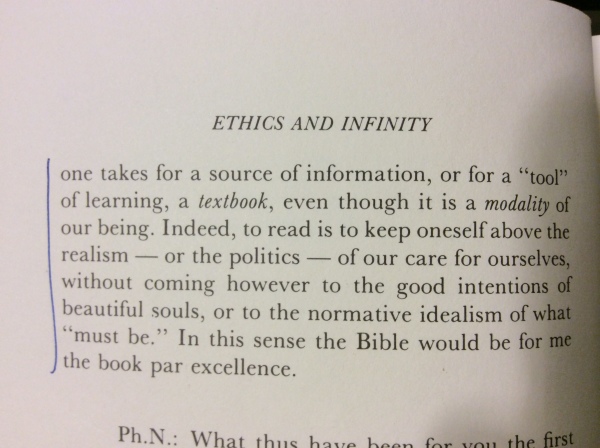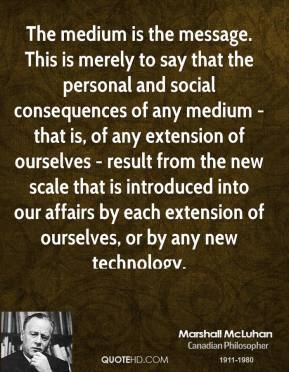This post was the rationale section of my initial dissertation proposal in the Spring of 2015.
 Levinas, Ethics and Infinity, 3-4.
Levinas, Ethics and Infinity, 3-4.
As much as I fear the codex and resist the dominance of print books, I love taking pictures of print book pages for quotes instead of retyping and citing. There is something about the materiality of the printed page, even when translated through digital images, that interrupts the seemingly contained flow of my words appearing on a screen. The image of the page reminds me that my work and my life are deeply multimedia and always intertextual and the pictures of the page help me hear the harmonies and dissonances of the other voices making up the choir that is my writing.
This particular book displayed above, Ethics and Infinity, begins with a reflection on books and one book in particular, the bible. I’m not sure what to make of this “great fear of bookishness” Levinas mentions, but i am utterly intrigued by his notion of the book as a “modality of our being.” Though I hear several registers in this comment by levinas, it has come to provide a kind of mantra for this project, a proximate bible, a way of succinctly stating why this project might matter in the world. How we read infinitely shapes and is shaped by how we engage the world.
I read this Levinasian sentiment of the deep relationship between books and humanness together with Marshall McLuhan’s classic statement of media as the extension of humanness in Understanding Media: The Extensions of Man.
 Reading books and the technologies we use to do this have something to say about what it means to be human. The cultural life of the bible has been entangled with the history of the book and its technologies since antiquity. So, this exploration of one particular book, “the book par excellence” in Levinas’s terms, and its technologies will hopefully push us to reflect on what it looks like to live humanly in this new media age.
Reading books and the technologies we use to do this have something to say about what it means to be human. The cultural life of the bible has been entangled with the history of the book and its technologies since antiquity. So, this exploration of one particular book, “the book par excellence” in Levinas’s terms, and its technologies will hopefully push us to reflect on what it looks like to live humanly in this new media age.
In Otherwise Than Being, Levinas offers another glimpse of his passion for books and their role in his philosophical inquiry. Here, we find a difficult and productive tension between the totality of the bound spine of a codex and the infinite interruption that is reading (Otherwise Than Being, 170-71).
It is this difficult and productive tension, perhaps a Difficult Freedom, that drives a proximate bible.